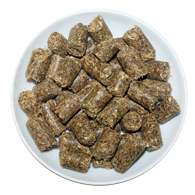Nutritional supplement for Australian herbivores including kangaroos, wallabies & wombats.
Key Features
- High in fibre: promotes chewing action and good digestive condition.
- Low Starch: reduces dental and gut problems associated with cereal grain diets.
- High in Antioxidants: to reduce oxidative stress and support immune system.
- Low in Oxalates: to assist urinary tract health.
Download Data Sheet

Ingredients
Grass, plant fibre, cereal meal, soy protein, lysine, methionine, vegetable oils, carotenoids, vitamins A, B1,B2,B3,B5,B6,B9,B12,C,D3,E,K, biotin, calcium, phosphorus, potassium, sodium, magnesium, zinc, iron, manganese, copper, iodine, selenium.
Analysis
| Protein |
13% |
| Fat |
5% |
| Crude Fibre |
22% |
| Neutral Detergent Fibre (NDF) |
40% |
| Starch (max) |
10% |
| Vitamin E |
250mg/kg |
| Total Oxalate (max) |
750mg/kg |
| Total Carotenoids |
25mg/kg |
| Metabolisable Energy |
9.0 MJ/kg |
Pack Sizes
5kg & 20kg.
Feed Wombaroo Kangaroo Pellets as a supplement to pasture, hay and native browse. Water intake may increase when feeding pellets, so always ensure that fresh water is available. Introduce pellets gradually into the diet to avoid sudden digestive upset.
Feed Guidelines
Feed rate will depend on body weight, body condition and quality of other foods consumed. The table below is based on the assumption that Wombaroo Kangaroo Pellets make-up 15% of the total dry matter intake of the diet. The remainder of the diet should consist of grass, hay, pasture & browse, and would vary depending on the individual species' requirements. 1 metric cup = approx. 120g of Wombaroo Pellets.

Converting to Kangaroo Pellets
Captive herbivores may become accustomed to eating large amounts of unhealthy foods like cereals (e.g. oats, muesli mixes, commercial "macropod" pellets), fruits, vegetables or lucerne hay. When converting over to Wombaroo Kangaroo Pellets these foods should be removed from the diet. This will help encourage intake of the Wombaroo Pellets.
When converting animals on to pellets it is preferable that:
- Animals are in good body condition and housed in a low-stress environment
- Weather conditions are mild (ie avoid extremes in heat or cold)
- Other "non-natural" feed items are removed such as fruit, vegetables, muesli or lucerne hay.
- Plenty of fresh water is provided.
Older animals tend to become set in their ways and can be difficult to convert onto to new food items. Young animals can be easily weaned on to pellets.
Pellets as a Weaning Food
Hand-reared joeys may be weaned onto pellets by soaking them in milk formula, initially making a sloppy mash. Gradually reduce the quantity of liquid as the joey weans on to the solid diet.






